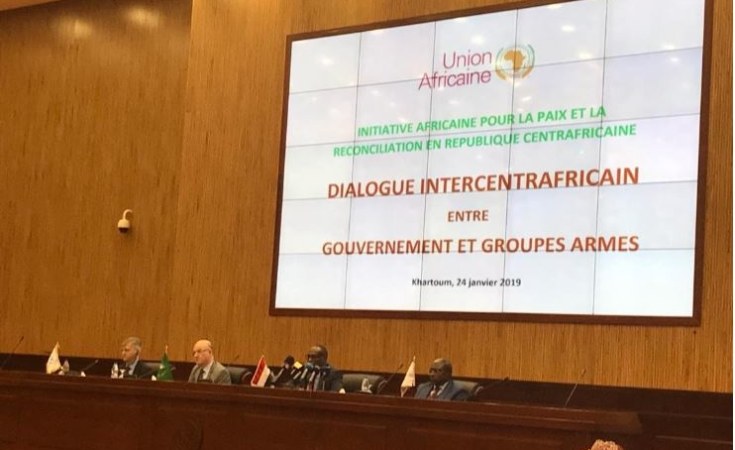Addis Ababa — The preparatory meeting for the planned Sudanese-Sudanese dialogue, organised by the African Union (AU), concluded its work in the Ethiopian capital, Addis Ababa, yesterday, with the confirmation that a conference will take place in Sudan after a ceasefire has been reached.
From July 10 to 15, the AU held meetings to arrange the launch of a political process for Sudan's civil political forces. The conclusion of the meeting was delayed for about two hours due to disagreements between the participating Sudanese political and civil society groups on some paragraphs of the final statement, related to condemning the paramilitary Rapid Support Forces (RSF) and the countries that support the militia.
There were also reportedly disagreements over forming an interim caretaker government, or one made up of technocrats. The final statement of the AU preparatory meeting called for an interim caretaker government to be formed, whose tasks, powers, and formation would be decided by all concerned parties.
Political dialogue conference
The statement also confirmed that a Sudanese-Sudanese political dialogue conference will take place in Sudan after a ceasefire has been reached between the warring Sudanese Armed Forces (SAF) and the RSF. It stipulates that the dialogue is "an entirely Sudanese process that belongs to all Sudanese people."
However, the dialogue conference will exclude some parties. "The Sudanese-Sudanese dialogue will be comprehensive and will not exclude anyone except those against whom accusations have been issued related to war crimes, crimes against humanity, or crimes of genocide per the law or the Constitutional Document."
The statement praised the humanitarian role played by several countries in helping Sudanese displaced persons and refugees and called on the Sudanese de facto government in Port Sudan to make more efforts to alleviate the suffering of the displaced and refugees.
'No military solution'
The chairperson of the African Union High-Level Committee on Sudan, Mohamed Ibn Chambas, stressed in a press statement yesterday that there is no military solution to the crisis in Sudan. "The continuation of the fighting only means more killing and suffering for the Sudanese," he said.
He added that the preparatory meeting for the inter-Sudanese dialogue "aimed to provide an environment for the Sudanese forces to consult on the issue. We decided that the AU would not interfere in the agenda of the consultations and that the participants would choose the topics and discuss them without our intervention."
The chairperson of the African Union Commission, Moussa Faki Mahamat, met with Ibn Chambas yesterday, accompanied by members of the Task Force on Sudan, including the Horn of Africa Intergovernmental Authority for Development (IGAD) Secretariat Envoy to Sudan and one of the facilitators of the meeting, Lawrence Korbandi.
Faki Mahamat said on his account on the X platform yesterday that the delegation briefed him on the results of the first preparatory meeting with "some Sudanese stakeholders as part of a larger consultation process geared towards envisaged AU-facilitated intra-Sudanese political talks to end the deadly conflict in the country and pursue a path to peace for all Sudanese."
Boycotting groups
The preparatory meeting was boycotted by the Civil Democratic Forces (Tagadom), mainstream Sudan Liberation Movement led by Abdelwahid Nur, Sudan People's Liberation Movement-North under the leadership of Abdelaziz El Hilu (SPLM-N El Hilu), and the Forces for Radical Change alliance. The Eastern Sudan Civil Forces Alliance was also not present as they had requested that the meeting be postponed.
South Sudanese Korbandi said at the press conference yesterday that they would continue to communicate with the groups that did not participate in this preparatory conference for the Sudanese-Sudanese dialogue.
He said that the situation in Sudan "requires continuous work to achieve stability" and renewed his call on the two warring parties "to engage in negotiations without restrictions or conditions." The de facto Sudanese government froze its membership with IGAD on January 20 under the context of an already tense relationship between the two parties.
Noureldin Sati, former Sudanese ambassador to the USA, acknowledged differences between the participants but said they were overcome in a friendly manner. "What was good is that the participants were the ones who decided on the vision of the dialogue, its topics, timing, and participating parties, including those supporting the dialogue internationally and regionally," she said.
Excluded groups
The dissolved National Congress Party (NCP) established in 1998 by key political Islamists in Sudan, severely criticised those participating in the preparatory meeting, as they decided to ban the NCP from participating in any future political process after the end of the war.
A statement issued on Sunday by the party's youth secretariat said that "talking about participation in the political process after the war is a leap over the major and important issues. It is premature talk. Rather, it confirms the narrow-mindedness of these political forces and their lack of understanding and comprehension of the nature of the challenge and crisis that our country is going through."
Formation of blocs
According to Tagadom, the parties participating in a number of different meetings about the future of Sudan "have formed blocs, and most of these blocs are artificial. These blocs want to participate with a huge number of individuals, while the role of some of the main parties, such as Tagadom, iss dwarfed."
The latest meetings have shown, apart from an increasingly shattered political landscape and polarisation (with the Communist Party of Sudan on one end and the returning NCP group on the other end), the existence of roughly two opposing groups of political parties and blocs: The non-aligned Civil Democratic Forces (Tagadom), chaired by former PM Abdalla Hamdok, which includes members of the Forces of Freedom and Change-Central Council, and the pro-SAF FFC-Democratic Bloc, and the National Forces Coordination.


